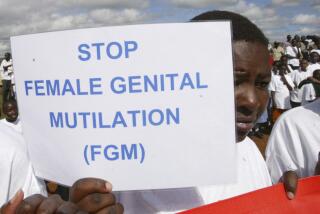WHO urges circumcision
- Share via
The World Health Organization recommended Wednesday that circumcision immediately become part of the frontline strategy to combat AIDS -- a move that the group said could save millions of lives.
The benefit would be greatest in countries with widespread epidemics and low rates of circumcision, such as those in southern and eastern Africa, the WHO said.
“The recommendations represent a significant step forward in HIV prevention,” said Dr. Kevin De Cock, director of the WHO’s HIV/AIDS Department. High-risk countries “now have an additional intervention, which can reduce the risk of HIV infection in heterosexual men.”
Circumcision in sub-Saharan Africa could prevent about 5.7 million new HIV infections and 3 million deaths over 20 years, the WHO said. That region recorded about 270,000 new infections in 2006, according to the WHO and UNAIDS.
“If you combine this with other modalities -- condom usage, responsible behavior, knowing the HIV status of your partner -- this is a big addition to that armamentarium,” said Dr. Anthony S. Fauci, director of the National Institute of Allergy and Infectious Diseases.
The WHO encouraged countries to provide circumcision for free, first targeting adults.
U.S. global AIDS coordinator Dr. Mark R. Dybul, who oversees the largest worldwide fund to fight AIDS, said the U.S. would “support safe male circumcision services ... as a part of an expanded approach to reduce HIV infections.”
WHO officials emphasized that circumcision should not give men a false sense of security. Circumcision does not provide complete protection against HIV, and people should continue other preventive practices, such as using condoms and reducing their number of sexual partners, experts said.
The recommendation were presented by WHO and United Nations officials after an international meeting on AIDS and circumcision this month in Montreux, Switzerland.
They were based on recent studies from Kenya, Uganda and South Africa that found circumcising heterosexual men reduced their risk of HIV infection by about 60%.
Dr. Maria J. Wawer, a Johns Hopkins University researcher and a co-author of the Uganda study, said she and her colleagues were pleased that the WHO and UNAIDS acted on the results. “If we had a vaccine this effective, people would be very enthusiastic,” she said.
Wawer said that circumcision programs were cost-effective. In Uganda, the procedures cost $69 per person, but this is considered expensive because the researchers did additional testing and used surgeons. She said nurses could perform the procedure with adequate training.
*






